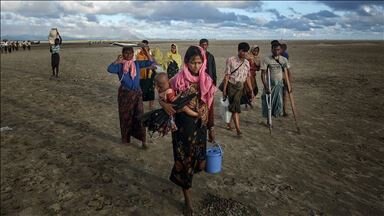Hawzah News Agency - Political parties in Myanmar have geared up for upcoming general elections with Nov. 8 set as the date for crucial polls which will be the first held under the civilian government in more than six decades.
The Union Election Commission announced the election date on July 1, inviting candidate registration from the 96 registered political parties from July 20 to Aug. 7.
A few days after the commission’s announcement, a 16-membered team was formed to assist Muslim candidates in campaigning in their constituencies countrywide. The team includes mainly Muslim legal experts.
Spokesman of the team Maung Muang Myint told that the group will help Muslim candidates financially, legally and technically.
“It was a shame that our parliament has no Muslim lawmaker although Muslims make up more than 5% of the country’s population,” he said over the phone.
“Of more than 6,000 candidates in the 2015 elections, only 28 were Muslims. And they won no seat,” he said, adding that the commission had rejected more than a hundred would-be candidates, mostly Muslims, on the grounds of citizenship. Election law states that candidates’ parents must be already recognized as citizens at the time of the candidates’ birth.
“So this year, we teamed up to help them in the whole process starting from candidate registration,” said Myint.
Two largest political parties in the county, Aung San Suu Kyi’s National League for Democracy (NLD) party and military-backed Union Solidarity and Development Party (USDP), did not file any Muslim candidates for the last general elections.
Parties have yet to submit the lists of candidates to election commission for registration. Myint, however, said Muslims have only a slim chance of being chosen as candidates of the political parties in the Buddhist-majority country.
“We do not hear anything about parties choosing Muslims as their candidates,” he said.
“So far, we are contacted by only about 20 independent Muslim candidates from Yangon, Mandalay and Rakhine.”
Aung Shin, spokesman of the NLD party, admitted the party had excluded Muslims as candidates to avoid the criticisms from Buddhist nationalist groups while religious tensions were running high ahead of the 2015 elections.
“It happened [in 2015], but it will not happen this time,” he told last week, affirming that the party will choose candidates regardless of race and religion.
“We do not have a policy not to select Muslim candidates, but it depends on the will of respective local communities,” Shin said.
He said respective local communities have been making lists of the would-be candidates, and the party’s Chief Executive Committee then to select suitable people from their lists.
“In this way, the candidate selection will reflect the desire of the host communities,” said Shin.
Min Htwe, like many other Muslims in Yangon’s Mingalar Taungnyunt township, does not believe strong political parties will include proper number of Muslim candidates running in the upcoming elections.
“I do not think the NLD and other parties would risk losing votes by selecting many Muslim candidates because majority of populations are Buddhists,” said Htwe in his 30s.
“But parties will include some Muslim candidates to claim that they have no discriminatory policy,” he said.
The Muslim community is concerned that not only there will be very few Muslim candidates running in the upcoming elections, but also most will be representing little-know
parties, left with slim chances of wining any seats.
“Most people would only vote for big parties, the NLD or USDP. So there will be likely another Muslim-free parliament unless these parties have Muslim candidates,” he said.

